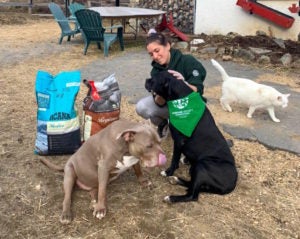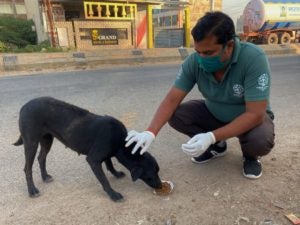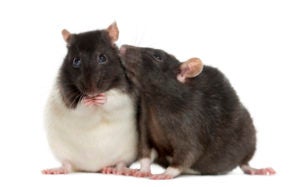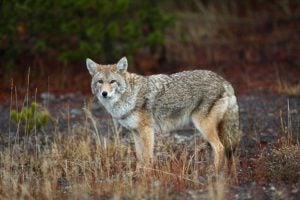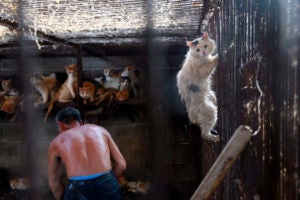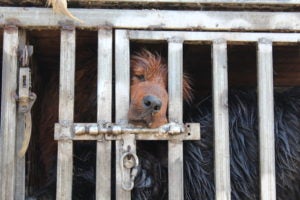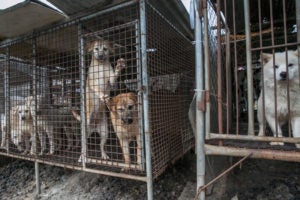
MONTREAL –More than 70 dogs found suffering by HSI on a hybrid dog meat farm and puppy mill in South Korea have been rescued and relocated to a temporary boarding facility in South Korea. Once safely off the farm, the dogs will immediately receive a full veterinary check-up and settle into their temporary quarters where they can begin their rehabilitation.
Many of the dogs will eventually be flown to HSI/Canada’s Montreal emergency shelter, where over 450 dogs from the dog meat trade have been successfully rehabilitated before being placed in forever homes. This marks the 16th dog farm that HSI has closed since its pioneering dog meat farm transition program began in 2015.
Several breeds were found on this facility, including tosas, Jindos, poodles, beagles, huskies, golden retrievers, Pomeranians, Chihuahuas and Boston terriers. The facility supplied two abusive industries: the meat trade, and the puppy mill trade. In rows of dilapidated cages, surrounded by animal waste, junk and garbage, some dogs were destined for the slaughterhouse, and others the unscrupulous puppy mill trade.
Émilie-Lune Sauvé, senior campaign manager for HSI/Canada, stated: “We are so relieved to know that these dogs, who have endured such misery, are safe at last. But millions more are still confined on dog meat farms in South Korea and this industry needs to be shut down for good. We urge South Korea to follow the example of the two cities in China that have recently banned dog meat trade, and end this suffering forever.”
Nara Kim, HSI/Korea’s dog meat campaigner, added: “Unfortunately, it is still very common in South Korea to see live puppies for sale in pet shop windows. But what most Koreans will be shocked to learn is that these same puppies could easily have ended up being killed for human consumption instead. Whether they live or die, they are all born in this miserable place, their mothers intensively bred over and over until they are exhausted and eventually sold to slaughterhouses. I’m so glad that this nightmare has ended for these lovely dogs, but until the government commits to phase out this dreadful industry, the nightmare continues for millions more.”
Opposition to eating dogs is growing steadily in South Korea, and a series of new regulations and court rulings are cracking down on this cruel industry.
To download broll video and photos of the rescue, click here.
Facts:
- Up to 2 million dogs a year are bred and raised on thousands of dog meat farms across South Korea.
- Dog meat consumption is declining in South Korea, particularly among younger generations, and most Koreans don’t eat it regularly. A June 2018 surveyby Gallup Korea showed that 70% of South Koreans say they will not eat dog meat in future. Still, dog meat remains popular during the Bok days of summer in July and August based on its perceived curative properties during the hot and humid summer months.
- There has been a series of recent crackdowns by authorities to curb the dog meat industry. In November 2018, HSI/Korea assisted Seongnam City Council in shutting down Taepyeong dog slaughterhouse (the country’s largest dog slaughterhouse), followed in July 2019 by the closure of Gupo dog meat market in Busan (South Korea’s second largest dog meat market after Moran market, which has also closed), and a declaration in October last year by the mayor of Seoul that the city is “dog slaughter free”. Most recently, last November HSI’s partner group Korea Animal Rights Advocates (KARA) won a Supreme Court case against a dog farmer who electrocuted dogs in violation of the Animal Protection Act, a judgement that could have huge implications for an industry that relies almost entirely on this brutal and protracted killing method.
- HSI has rescued more than 2,000 dogs from South Korea’s meat industry. At each dog meat farm closure, HSI has a veterinarian test for the presence of the H3N2 virus (“canine influenza”), at the time the dogs receive their rabies, DHPP and coronavirus vaccines. HSI also vaccinates the dogs for distemper and parvo. HSI then quarantines the dogs on the farm or at a shelter for at least 30 days, and the dogs are health certified again prior to transport overseas.
- Dog meat consumption has been steadily declining in South Korea, and is banned or severely restricted in Hong Kong, Taiwan, Thailand, Singapore and the Philippines. As global pressure builds for countries across Asia to permanently close wildlife wet markets amid coronavirus risks, the array of undeniable human health risks posed by the dog meat trade in South Korea and across Asia, is strengthening calls for action across the continent.
-30-
Media contact: Christopher Paré, Director of Communications, HSI/Canada – Cell: 438-402-0643, email: cpare@hsi.org
Humane Society International/Canada is a leading force for animal protection, with active programs in companion animals, wildlife and habitat protection, marine mammal preservation, farm animal welfare and animals in research. HSI/Canada is proud to be a part of Humane Society International which, together with its affiliates, constitutes one of the world’s largest animal protection organizations. Celebrating animals and confronting cruelty worldwide and on the web at hsicanada.ca.

